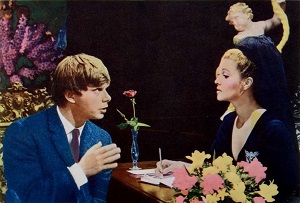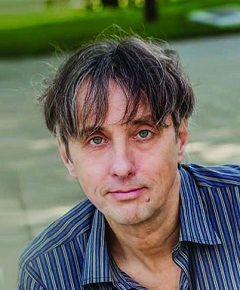De Britse schrijver Evelyn Waugh werd geboren in Londen op 28 oktober 1903. Zie ook alle tags voor Evelyn Waugh op dit blog.
Uit:The Loved One
“The benefits of the plan are twofold” — she was speaking by the book now with a vengeance — “financial and psychological. You, Mr. Barlow, are now approaching your optimum earning phase. You are no doubt making provision of many kinds for your future — investments, insurance policies and so forth. You plan to spend your declining days in security but have you considered what burdens you may not be piling up for those you leave behind? Last month, Mr. Barlow, a husband and wife were here consulting us about Before Need Provision. They were prominent citizens in the prime of life with two daughters just budding into womanhood. They heard all particulars, they were impressed and said they would return in a few days to complete arrangements. Only next day those two passed on, Mr. Barlow, in an automobile accident, and instead of them there came two distraught orphans to ask what arrangements their parents had made. We were obliged to inform them that no arrangements had been made. In the hour of their greatest need those children were left comfortless. How different it would have been had we been able to say to them: ‘Welcome to all the Happiness of Whispering Glades.’ “
“Yes, but you know I haven’t any children. Besides I am a foreigner. I have no intention of dying here.”
“Mr. Barlow, you are afraid of death.”
“No, I assure you.”
“It is a natural instinct, Mr. Barlow, to shrink from the unknown. But if you discuss it openly and frankly you remove morbid reflexions. That is one of the things the psycho-analysts have taught us. Bring your dark fears into the light of the common day of the common man, Mr. Barlow. Realize that death is not a private tragedy of your own but the general lot of man. As Hamlet so beautifully writes: ‘Know that death is common; all that live must die.’ Perhaps you think it morbid and even dangerous to give thought to this subject, Mr. Barlow, the contrary has been proved by scientific investigation. Many people let their vital energy lag prematurely and their earning capacity diminish simply through fear of death. By removing that fear they actually increase their expectation of life. Choose now, at leisure and in health, the form of final preparation you require, pay for it while you are best able to do so, shed all anxiety. Pass the buck, Mr. Barlow; Whispering Glades can take it.”

Evelyn Waugh (28 oktober 1903 – 10 april 1966)
Scene uit de gelijknamige film uit 1965 met Robert Morse als Dennis Barlow (links)

